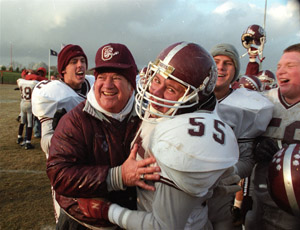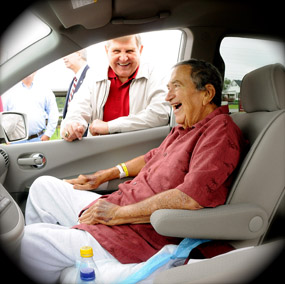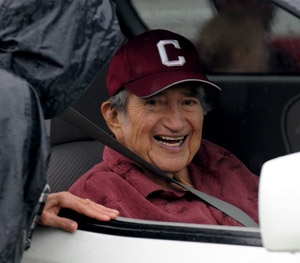Oct. 5, 2009
For Immediate Release
CAMPBELLSVILLE PATRIARCH FOOTBALL COACH RON FINLEY DIES AT 76
Funeral arrangements: Visitation from 5:01 p.m. to 8:01 p.m. (Central Time) Wednesday, Oct. 7 at First Baptist Church, Russell Springs, Ky., on East 80
By Richard RoBards, SID assistant
The man who brought life to a dormant Campbellsville University football program has lost his battle to extend his.
Ron Finley, 76, who preached on-field excellence and demanded off-field values, died Monday, Oct 5 at 2:20 p.m. while under care for various health ailments at a Greensburg rehab center.
“Coach Finley was a man who believed in possibilities,” said University President Michael V. Carter. “He believed every young man who came to play for him had great potential in the game of life.
“He lived and taught that life is a gift from God. He had a depth of character that inspired those around him.”

Finley, whose name appears on the Campbellsville University football stadium, kick started the sport in 1987 after football sat in a holding pattern for 30 years. The 1988 varsity season was his first (he coached one junior varsity season), and he owns 77 of the school’s 107 victories, four games into the institution’s 23rd season.
The 2009 football players will be wearing helmet stickers in memory of Finley for Saturday’s homecoming game and for the remainder of the season.
Finley ended his college coaching career in 2002 with a 77-81-1 record, but in his last seven seasons his teams compiled a 43-32 worksheet. His teams reached post-season play three times in his 15 seasons, one being an invitation in the KWTO Bowl in 2000.
“I truly believe that there isn’t anyone who knew him that didn’t know he was into developing young men to their full potential,” said Dr. Ken Winters, CU president for 11 of Finley’s 15 years.
Dr. W.R. Davenport, CU president when Finley was hired ashead coach at CU, said, “When the decision was made to have collegiate footballat Campbellsville, it changed the course of the institution. And Ron Finley wasa major player in that change.
“While Coach Finley started with nothing, his record speaksfor itself. But probably the greater story is his success with young men. Yes,he built football at Campbellsville, but he built men for life and foreternity.
“God blessed Ron as our coach; and God blessedCampbellsville University as Ron served us,” said Davenport.
In 2006, the stadium where his beloved Fighting Tigers still play, was officially named in his honor.
What Finley did was create a mood — a family, if you will — that invigorated a campus each fall. It was Finley’s football team that helped lead to the creation of the Tiger Marching Band — no football, no need for a marching band. He is the only coach in 23 years to beat heated rival Georgetown (three times) and lead a team to the NAIA playoffs (two times).
“I know I gave a lot of credit to the football team and the companion marching band for creating a Saturday afternoon experience,” Winters said.
“That’s what college football is all about.”
Finley’s team’s stirring 1997 win at Georgetown led to the Fighting Tigers first post-season appearance.
“Campbellsville University has lost one of the great ones who helped to make today’s accomplishments a reality. We will miss him, but we will remember his determined spirit and belief that the possible can become a reality with faith, hard work, and commitment to see a job done well,” said Carter.
In 1992, with his team ranked second in the nation, the Fighting Tigers made a trip Lambuth University, according to then-assistant coach Eric Graves, who coached with his mentor for the full compliment of Finley’s CU career.
“I’ll never forget it,” Graves said. “Lambuth came back and beat us and coach said: ‘Am I disappointed? Yes. But there’s something bigger than this ball game.’ That’s when he shared his relationship with Christ to the team.”
Graves, who was with Finley and family members when he died, said the coach was sometimes hard on him.
“If he felt I was doing something wrong, he got down on you pretty hard. But he didn’t do it out of meanness, he did it out of love.”
Haywood Riner, who also coached with Finley for his entire 15-year CU career, said his former boss was all about bringing out the best in his coaches and his players.
“When I interviewed he only asked me one question: ‘Will you be loyal to me?’”
Riner said yes, and he was hired on the spot.
“He was all about doing things right, whether it be winning football games, showing respect, being a gentleman and working hard academically,” said Riner. “You always knew where you stood with coach.”
At a recent dinner that initiated an endowed scholarship in his honor, Finley was showered with love from former players.
“Coach Finley made me a better man, a better husband, a better father and a better person,” Chris Morgan said.
Nick Thurmond said he remembered Finley saying: “A grown man always carries a pen” and “There are three things you can’t change: the weather, the referees and the other team.”
“Coach had us all attend church together,” remembered Junior Higdon, now principal at Taylor County High School. “He loved us, and he loved Jesus Christ. We had a positive role model in Coach Finley.”
Finley vetted an equal amount of love and discipline — something he said young men needed.
“Some of the players said I was kind of hard on them,” Finley said in remarks at the May 29, 2009 dinner. “But I said, ‘Life is hard’ and they learned.”

Jack Lengyel, the legendary coach of Marshall University after the 1970 team was killed in a tragic plane crash and who was in Campbellsville Sept. 26, after learning of Finley’s passing, said: “I am very pleased I had the opportunity to meet and talk to Coach Ron Finley on my recent visit to the campus. He was very interesting to talk to and his recall of the history of football at Campbellsville was amazing.”

“When you playedfor coach, besides spreading the Word of God, was the help he gave usin the setting of priorities,” said Rod Turpin, who played for CU from1990 to 1993.
Turpin, who now coaches at Taylor County High School, said he knew from the first minute that he wanted to play for Finley.
“He was a driving point for me in college. He put everything in focus.”
Turpin joined theFighting Tigers as a little older freshman after spending four years inthe military after high school. That military experience toughenedTurpin, but it was Finley, he said, that added a little focus andpolish.
“Coach (Haywood)Riner likes to tell the story that I came in wearing camouflage,” saidTurpin. “I don’t know if that’s true, but it makes for a good storyline.
“He has been a hugeinfluence on my life,” said Turpin. “He’d call every now and then andurged me to stay true to what I believe.”
Herb Wiseman, who played at CU two years after transferring in from a school in Florida and also spent seven years as an assistant, said Finley never wavered from his values
“If you didn’t conform, you weren’t going to be around long,” Wiseman said. “But if you did what he wanted then he’d be the first one there to help you.
”Wiseman said he’s convinced that he would have never graduated from college if it hadn’t been for his coach.
“I was there in the beginning. I’ll carry with me many memories and I’ll cherish and remember them forever.”
